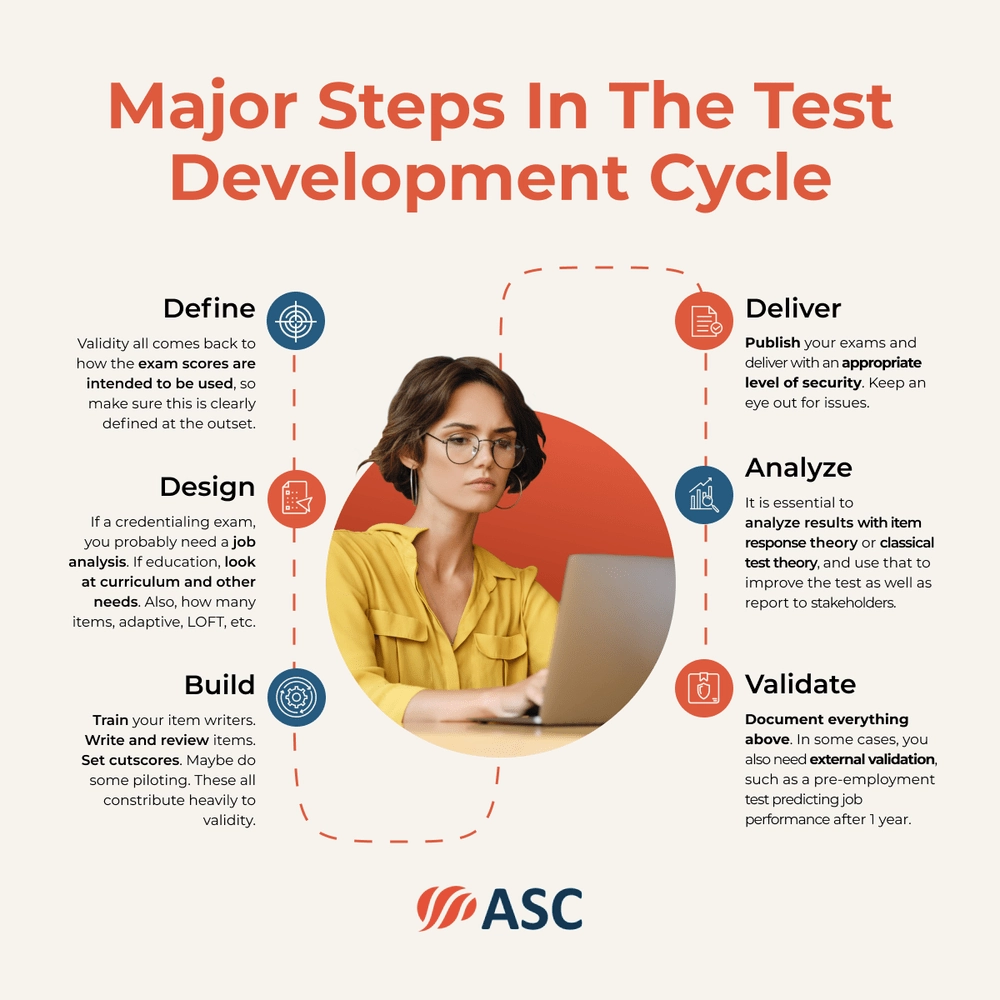NCCA accreditation is a stamp of approval on the quality of a certification program, governed by the National Commission for Certifying Agencies (NCCA).™ This is part of the Institute for Credentialing Excellence™, the leader in the world of professional credentialing. NCCA accreditation tells your certificants – plus all stakeholders in your profession, including hiring managers and customers/patients – that the credential meets best practices and international standards, so they can trust the quality of the personnel who have achieved it.
Achieving the NCCA accreditation of your certification is a ton of work, both upfront and ongoing. This article provides a brief introduction.
Want to talk to one of our accreditation experts? Contact us.
NCCA accreditation requirements
Getting a certification accredited shows that it is of good quality. Anyone can write 50 questions on a topic in their basement and throw it up on some free survey/quiz software, then call it a certification. In fact, many places do, and charge hundreds of dollars for this. NCCA accreditation is a pushback on this practice, where respectable certifications banded together and agreed on a few main points regarding what is high quality. Some examples:
- You must have an oversight board, which includes a public member.
- You must have a legitimate organization with annual audited financial statements. This is usually non-profit, but that is not required.
- You must have policies for application, retakes, continuing education, and more.
- There must be a firewall between certification staff and education staff.
- The test must be professionally designed and maintained.
- The test must be delivered securely, with proctoring.
What do we mean by “certification program”?
A certification is a validation of a person’s skills and knowledge for a particular profession. We all think of it as a test that must be passed, but that’s actually a minority of the process. There are also things like initial education, eligibility pathways to sit for the exam, retake policies, how to get recertified, continuing education, etc. On top of that, there are organizational issues; you need to make sure that there is an appropriate governing board, that education and certification staff don’t overlap, that you have valid financial accounting, etc. So that’s why the accreditation refers to a “program” and not just a “test.”
This means that an organization with multiple certification programs will need to apply for accreditation on each. However, since many of the aspects are about the organization (e.g., financial statements), there is massive overlap and these can be re-used for each.
What do we mean by “stamp of approval”?
NCCA is a panel of experts, composed of a range of stakeholders in the industry: PhD psychometricians, internationally-known certification managers, attorneys with expertise in this specific topic, and so on. You need to complete a formal application process, submitting tons of documentation about the aforementioned topics. The panel will then review this and grant accreditation, stating that you have followed all the standards.
Again, note that this is not just a stamp of approval on the exam. If you have an exam for certified Widgetmakers and you have a panel of expert Widgetmakers, the NCCA is not going to evaluate your actual questions. They are evaluating much bigger questions. Do you have a nonprofit board set up and have the correct legal governance? Do you have audited financial statements like any other sound entity? Do you have a published Candidate Handbook that lays out everything from how to initially apply for the certification to how to maintain it for your career?
Why should we get accredited?
In many cases, it is not necessary to achieve NCCA accreditation. There are really seven reasons:

- Quality Assurance: Accreditation ensures that a certification program meets established standards of quality and rigor. It validates that the program has undergone a comprehensive review by an independent accrediting body and has demonstrated its adherence to industry-recognized standards and best practices. Accreditation helps maintain and improve the quality of the certification program over time.
- Credibility and Recognition: Accreditation adds credibility and recognition to a certification program. It signifies that the program has been evaluated by experts in the field and has met rigorous criteria. Accreditation enhances the reputation of the certification, making it more valuable and trusted by employers, professionals, and other stakeholders. This helps you sell more certifications; remember, credentialing is a business and certifications are the flagship product!
- Industry Acceptance: Accreditation can increase the acceptance and recognition of a certification within the industry or professional community. It provides assurance to employers, clients, and regulatory bodies that the certified individuals have acquired the necessary knowledge, skills, and competencies to perform their roles effectively.
- Competitive Advantage: Some fields, like personal trainers, have many organizations that offer training and certifications. Achieving certification provides an advantage over your competitors in the marketplace.
- Standardization: Accreditation promotes standardization and consistency in the certification process. It ensures that the program’s content, assessment methods, passing criteria, and recertification requirements are fair, transparent, and consistent across all candidates. Standardization helps maintain a level playing field and ensures that certified individuals possess the same level of expertise.
- Career Advancement: Accreditation can enhance career opportunities for individuals holding the certified credential. It demonstrates their commitment to professional development and continuous learning. Accredited certifications are often preferred or required by employers, which can lead to better job prospects, promotions, and salary advancements.
- Regulatory Compliance: In some industries or professions, accreditation may be a requirement for regulatory compliance. Certain certifications may be mandated by licensing boards or regulatory authorities to ensure public safety, consumer protection, or adherence to specific standards and regulations. Another example is that if you are selling certifications to members of the US Military, they need to be accredited.
These are all very good reasons, certainly.
What is involved in NCCA accreditation?
The time and cost can vary widely depending on the current state of your organization. If you read the NCCA Standards (requirements to get accredited), they generally fall into 3 categories:

1. Psychometrics and test development: You need to follow best practices in making the exam. You can’t just write 50 items in your basement. You need statistical reports, job task analysis study, standard setting studies a defensible pass score, and much more. The infographic here provides a very broad overview.
2. Certification operations and policies: You need to establish policies and procedures, then document them in a Candidate Handbook. You need to set up a business: accepting payments, bookkeeping, tracking status, retakes, annual recertification, perhaps a member conference or webinars, etc. Often, a certification management system will help with this.
3. Business/legal/governance: You need to be a legit organization with Bylaws and audited financial statements. You will need a governance structure, like an overall Board of Directors, and then committees on Certification, Education, or other aspects.
What is the cost of NCCA accreditation?
A rule of thumb that I have heard in the industry is that achieving NCCA accreditation for a certification exam will take 1 year and $100,000. Most of that is for parts 2 and 3, which are typically done by you, and not your testing vendor. So those costs are not what is paid to NCCA for the application process, either. It is up to your staff, to work on a quality Candidate Handbook, set up quarterly webinars for continuing education, create a registration portal – whatever makes sense for you, as long as it follows the Standards. In some cases, they might be things you already do, such as audited financial statements.
We specialize in the psychometrics, which costs far less than $100,000 and takes 3-6 months depending on availability of your subject matter experts. We can certainly work on parts 2 and 3 if you do not have bandwidth and expertise internally. We can also deliver the exams for you.
If you aren’t sure of the next steps, we can perform an audit on your current state and potential timeline, which will provide a much clearer picture. CONTACT US to learn more.
Note: this is not an endorsement of NCCA by ASC, or vice versa, and is meant for educational purposes only.

Nathan Thompson earned his PhD in Psychometrics from the University of Minnesota, with a focus on computerized adaptive testing. His undergraduate degree was from Luther College with a triple major of Mathematics, Psychology, and Latin. He is primarily interested in the use of AI and software automation to augment and replace the work done by psychometricians, which has provided extensive experience in software design and programming. Dr. Thompson has published over 100 journal articles and conference presentations, but his favorite remains https://scholarworks.umass.edu/pare/vol16/iss1/1/ .

